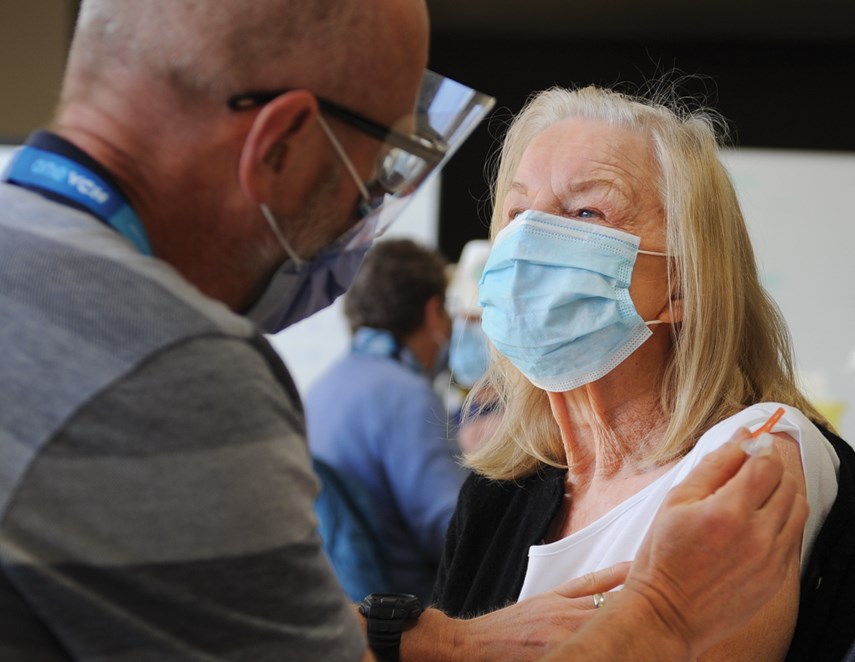Though the weather is telling us another story this year – seemingly endless sunshine, and warmer weather than most mid-Octobers – the winter will be here before we know it.
I heard a rumour that it is going to be a wet, cold winter. In preparation for the colder, rainier months there is a lot we can do to prepare.
The number one strategy, in my view, is getting your flu and pneumonia shots and your next COVID booster. Last year in the October 2021 edition of On Health, an article said that “Experts expect that the flu will make a comeback this winter circulating along with other seasonal respiratory viruses as well as the coronavirus.” I think it will be the same this year. Because of a more relaxed attitude to COVID-19, many people are not masking up or keeping their distance from one another, so this could provide added risks for contacting the viruses. I feel like I was blessed over the last two years – mercifully, no colds or flus.
During the winter, respiratory diseases can disproportionately affect older people. Many people do not realize vital respiratory health is related to aging well. Keeping your respiratory system healthy can improve your quality of life and help you live longer.
However, immune function naturally decreases with age, because as we grow older, our immune system becomes slower to respond to outside influences and causes us to be more susceptible to respiratory illnesses. In fact, older adults have a far higher risk of contracting infections like colds, flus, and pneumonia than younger people.
So, what can we do? Experts say, “consider vaccinations as a first line of defence.” If we get vaccinated, we may avoid getting these three diseases ourselves and we also prevent spreading these diseases to other more immune-compromised people, pregnant women, and those who don’t or won’t get vaccinated. Most importantly, research has shown that if after being vaccinated you do contract flu, pneumonia, or COVID-19, your risk of a serious, lengthy illness or hospitalization is reduced.
Aside from getting your shots and staying connected, we can also stay healthy through exercise, eating well, getting enough sleep, getting outdoors, and staying hydrated.
Every winter, house bound seniors are also at an increased risk of depression, isolation, and other health related issues. These factors can adversely affect senior’s well-being and independence. Research has shown the health risks of social isolation include the following: increased chance of premature death; reduced sense of well-being; disability from chronic diseases; poor mental health; increased use of health and support services; caregiver burden; and an increased number of falls.
Like the use of vaccinations as a first line of defence in keeping our respiratory systems safe, staying connected to family, friends and community is perhaps the best strategy to keep from getting depressed and isolated in the cold, rainy months ahead.
What can you do to stay connected? You could try visiting your friends and neighbours regularly now that the COVID restrictions have been reduced. Try chatting with friends on the phone or invite friends to take a walk with you. Try volunteering – this gives you an opportunity to give back to the community and will increase your own sense of well being. North Shore groups are always looking for people – connect with North Shore Community Resources Society to see where you might fit in. They can be reached at 604-985-7138.
You can also get out to seniors’ centres and other organizations to get your social needs met. Most organizations that provide programs and services for seniors are fully up and running. Programs run the gamut from exercise (yoga, dancing, osteofit), brain games (bridge, computer classes), workshops (travel to an exotic place), classes (conversational Spanish, Elder College), and so on. Information can be found in the 2022 Seniors Directory, published by the North Shore News and available at NSCR.
While we usually do not experience the cold weather that our friends farther north do, we can have some cold weather snaps bringing snow or freezing rain and ice that we need to prepare for.
If you want to get outdoors more, some practical suggestions include: dress appropriately, be careful getting out of your car, avoid taking shortcuts when out walking, take extra time preparing to go out, pay attention on slippery sidewalks, and try not to get distracted. Keep your driveway and walkways salted and clear, and prepare your house, car, and yourself for the cold and rainy months.
Always be prepared, say the Boy Scouts. So let’s follow their example.
Margaret Coates is the co-ordinator of Lionsview Seniors’ Planning Society. She has lived on the North Shore for 51 years and has worked for and with seniors for twenty-six of those years. Ideas for future columns are welcome – email [email protected].



